
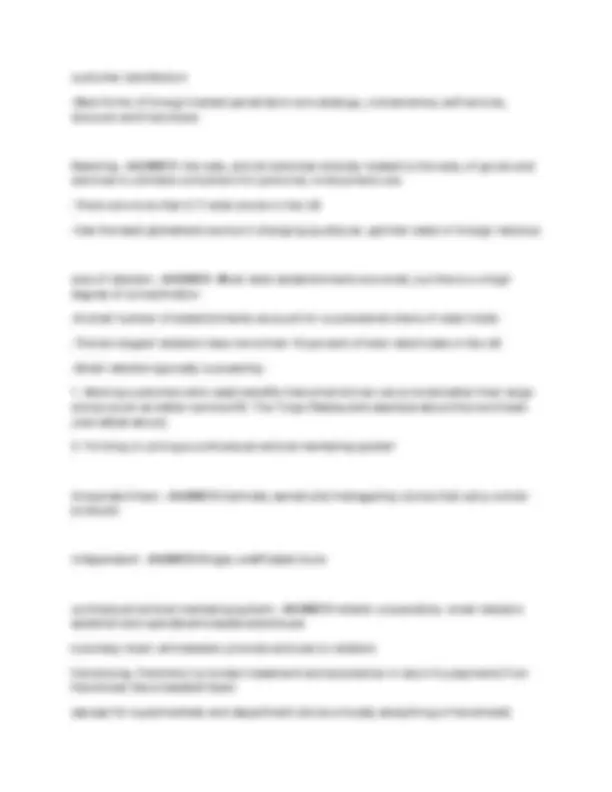
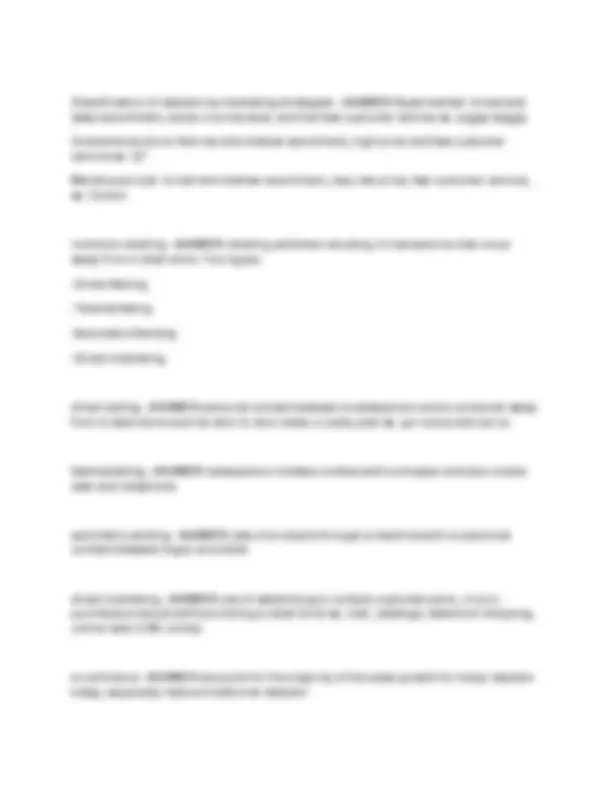
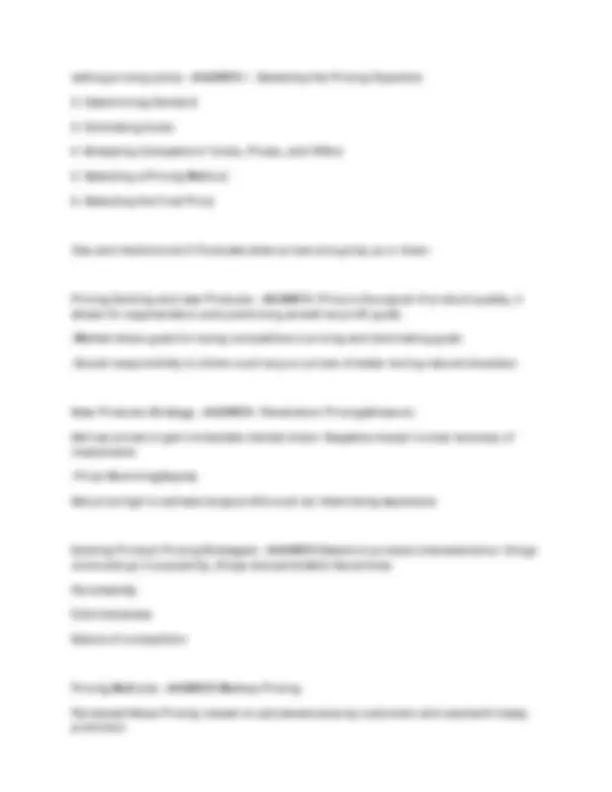
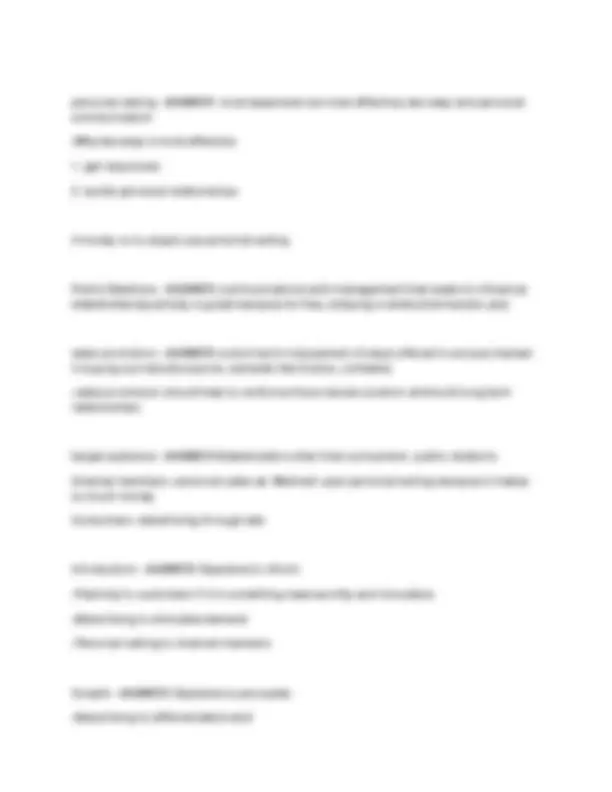
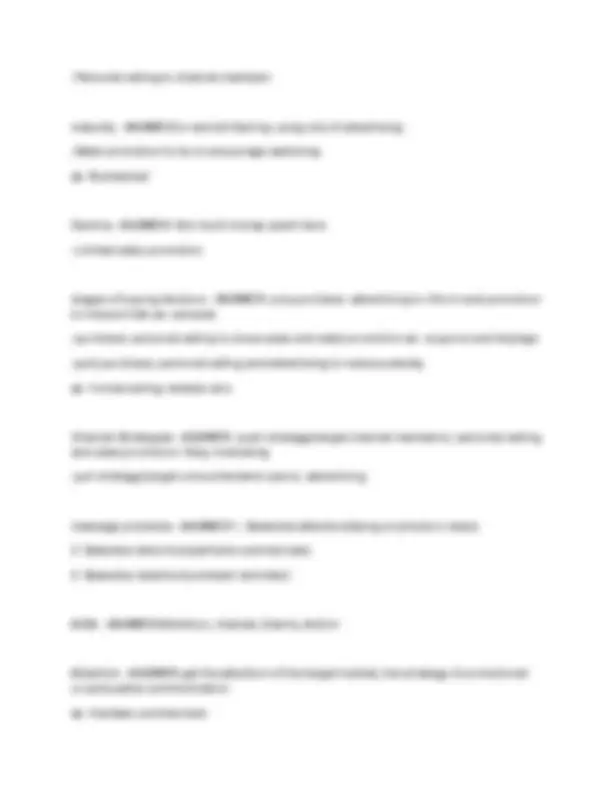
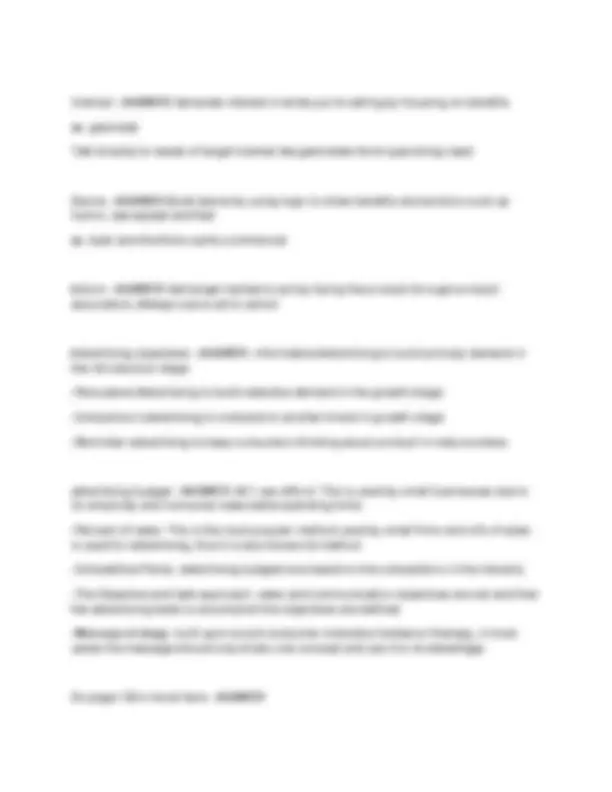
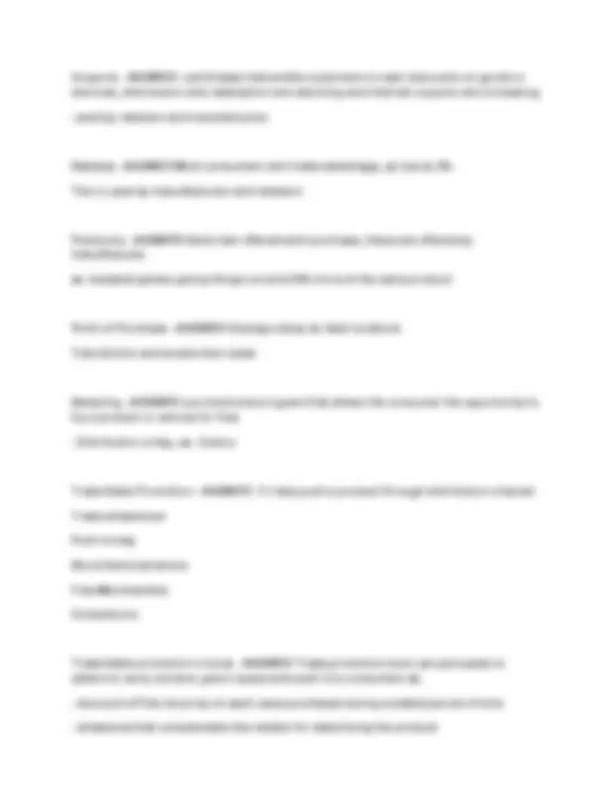
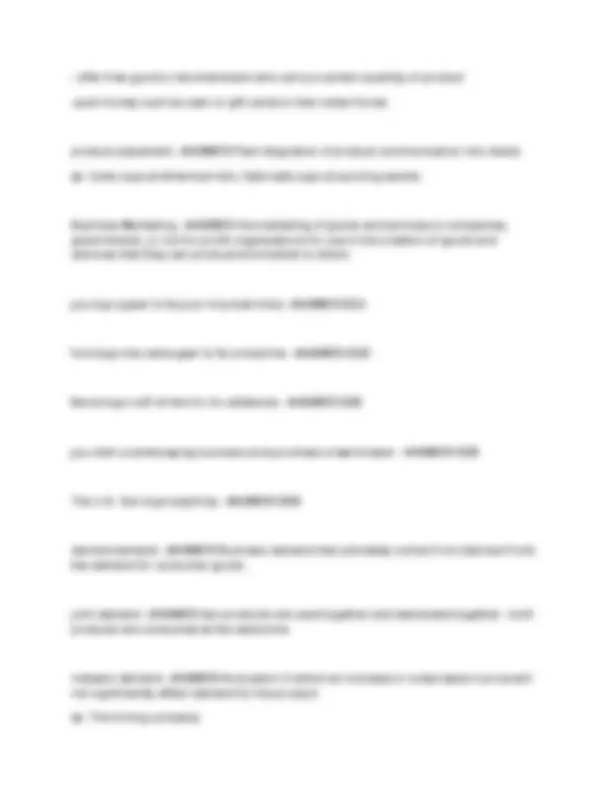
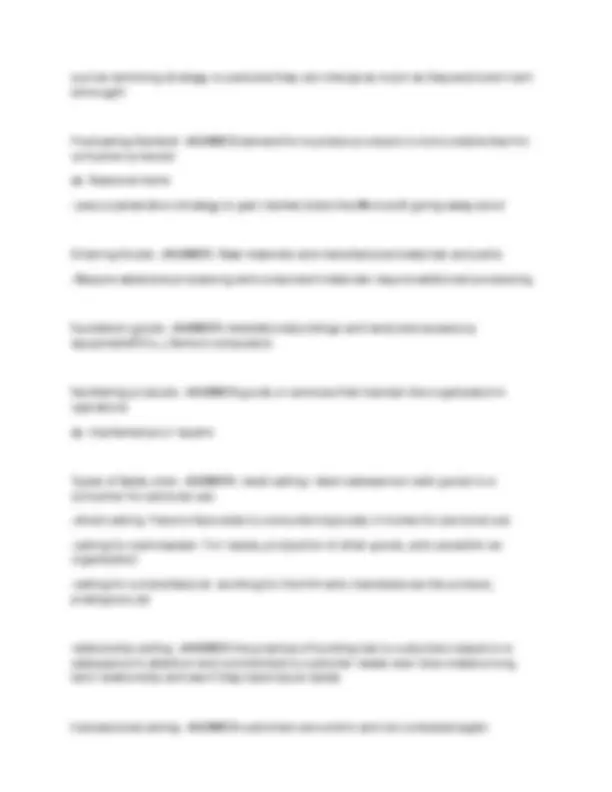


Study with the several resources on Docsity

Earn points by helping other students or get them with a premium plan


Prepare for your exams
Study with the several resources on Docsity

Earn points to download
Earn points by helping other students or get them with a premium plan
Community
Ask the community for help and clear up your study doubts
Discover the best universities in your country according to Docsity users
Free resources
Download our free guides on studying techniques, anxiety management strategies, and thesis advice from Docsity tutors
This overview covers key marketing concepts: distribution intermediaries, retailing strategies, and pricing policies. It examines distribution channel functions (transactional, logistical, facilitating) and coverage strategies (intensive, selective, exclusive). Retailing types, such as supermarkets, convenience stores, warehouse clubs, and nonstore methods, are explored. The document outlines pricing policy steps: objectives, demand analysis, cost estimation, and competitive analysis. It also discusses pricing strategies for new/existing products, promotional, discriminatory, and psychological pricing. A valuable resource for marketing students, it offers insights into distribution and pricing strategies for achieving marketing goals.
Typology: Exams
1 / 17

This page cannot be seen from the preview
Don't miss anything!










Distribution Intermediary Functions - ANSWER -Transactional -Logistical -Facilitator -Informing
Transactional - ANSWER -Buying and selling -Risk taking
Logistical - ANSWER -concentration -storing -sorting -physical distribution
Facilitator - ANSWER -Financing -Grading
Informing - ANSWER -Marketing research to companies -Providing information to consumers
channel members - ANSWER are also called distributors, intermediaries, or middlemen, and membership includes wholesalers as well as reatailers
coverage or channel width - ANSWER the number of distributors offering product/service
channel depth - ANSWER -the levels of warehouses/distributors/brokers between producer and consumer -many smaller manufacturers often use deep channels to distribute their goods particularly when they want to to distribute via small independent retailers
three coverage strategies - ANSWER -Intensive -Selective -Exclusive
intensive distribution - ANSWER -Provide offers in as many outlets as possible to maximize exposure -Sales are dependent on customers seeing an item and no sales effort at point of purchase -This is a routine decision and is lower priced items like a Hershey's bar -most extreme example is vending machines
slective distribution - ANSWER -Provide offerings in selective outlets and to distribute in areas based on performance capabilities -This uses a limited decision and is like higher priced candy such as Lindor or medium end cars like Audi -some coverage and moderately priced
exclusive distribution - ANSWER -Using only one outlet in a geographic area and the objective is the maximize the "push" of a distributer -Maximum sales effort at point of purchase and little coverage, tend to carry one line, excellent after sale service -This uses extensive decision making and is for luxury things like Ferrari, Rolex watches, and IKEA
Global Distribution - ANSWER -Decentralized distribution is often believed to optimize
Classification of retailers by marketing strategies - ANSWER Supermarket: broad and deep assortment, varies in price level, and has few customer service ex. piggly wiggly Convenience store: Narrow and shallow assortment, high price and few customer service ex. QT Warehouse club: broad and shallow assortment, very low price, few customer service, ex. Costco
nonstore retailing - ANSWER retailing activities resulting in transactions that occur away from a retail store. Four types: -Direct Selling -Telemarketing -Automatic Vending -Direct marketing
direct selling - ANSWER personal contact between a salesperson and a consumer away from a retail store such as door to door sales or party plan ex. girl scout and cut co.
telemarketing - ANSWER salesperson initiates contact with a shopper and also closes sale over telephone
automatic vending - ANSWER sale of products through a machine with no personal contact between buyer and seller
direct marketing - ANSWER use of advertising to contact customers who, in turn, purchase products without visiting a retail store ex. mail, catalogs, television shopping, online retail (18% online)
e-commerce - ANSWER accounts for the majority of the sales growth for many retailers today, especially mature traditional retailers
setting pricing policy - ANSWER 1. Selecting the Pricing Objective
Gas and medicine don't fluctuate when prices are going up or down
Pricing Existing and new Products - ANSWER -Price is the signal of product quality, it allows for segmentation and positioning as well as profit goals. -Market share goals for being competitive in pricing and dominating goals -Social responsibility to others such as your prices of water during natural disasters
New Products Strategy - ANSWER -Penetration Pricing(Amazon) Set low prices to gain immediate market share. Negative impact is slow recovery of investments -Price Skimming(Apple) Set price high to achieve large profits such as Intels being expensive
Existing Product Pricing Strategies - ANSWER Based on product characteristics: things come and go in popularity, things are perishable like airlines Perishability Distinctiveness Nature of competition
Pricing Methods - ANSWER Markup Pricing Perceived Value Pricing- based on perceived value by customers and used with heavy promotion
Discriminatory Pricing - ANSWER Legal as long as it doesn't substantially hinder competition ex. VS charing more in Cali than here ex. student discounts and elderly discounts as well as insurance charging more for guys than girls
psychological pricing - ANSWER Using the price to make the customer feel a way about the product use odd pricing for cheap items and even pricing for expensive items
Discount and allowance pricing - ANSWER reducing prices to reward customer responses such as paying early or promoting the product -cash discount: price reduction who pay bills immediately -quantity discount: a price reduction to buys who buy bulk -noncumulative quantity: given for a single purchase -cumulative quantity: given over a number of purchases over time -Functional discount: offered by the seller to trade channel members who perform certain functions
Integrated Marketing Communications - ANSWER -Advertising -Personal selling -Public relations -Sales promotion
Advertising - ANSWER -most efficient and cost effective, as well as cheapest per person -paid form of non personal communication
personal selling - ANSWER -most expensive but most effective, two-way and personal communication -Why two-way is most effective:
if money is no object use personal selling
Public Relations - ANSWER communications with management that seeks to influence stakeholders(publicity is great because its free, lobbying is what pharmacists use)
sales promotion - ANSWER a short-term inducement of value offered to arouse interest in buying a product(coupons, samples like Costco, contests) -sales promotion should help to reinforce the products position and build long term relationships
target audience - ANSWER Stakeholders other than consumers- public relations Channel members- personal sales ex. Walmart uses personal selling because it makes so much money Consumers- advertising through ads
Introduction - ANSWER Objective to inform: -Publicity to customers if it is something news worthy and innovative -Advertising to stimulate demand -Personal selling to channel members
Growth - ANSWER Objective to persuade: -Advertising to differentiate brand
Interest - ANSWER Generate interest in what you're selling by focusing on benefits ex. gatorade Talk directly to needs of target market like gatorades thirst quenching need
Desire - ANSWER Build desire by using logic to show benefits and emotion such as humor, sex appeal and fear ex. beer and the Volvo splits commercial
Action - ANSWER Get target market to act by trying the product through product association, Always use a call to action
Advertising objectives - ANSWER -Informative Advertising to build primary demand in the introduction stage -Persuasive Advertising to build selective demand in the growth stage -Comparison advertising to compare to another brand in growth stage -Reminder advertising to keep consumers thinking about product in mature phase
advertising budget - ANSWER -All I can afford: This is used by small businesses due to its simplicity and it ensures reasonable spending limits -Percent of sales: This is the most popular method used by small firms and a % of sales is used for advertising, thus it is also the worst method -Competitive Parity: advertising budgets are based on the competitors in the industry -The Objective and task approach: sales and communication objectives are set and then the advertising tasks to accomplish the objectives are defined -Message strategy: built upon sound consumer motivation behavior therapy, in most cases the message should only stress one concept and use it to its advantage
Do page 125 in book here - ANSWER
reach - ANSWER the number of target consumers exposed to a commercial at least once during a specific period, usually four weeks
Frequency - ANSWER the number of times on average that those reached are exposed to the ad over the time frame impact = rach x frequency
Creative limitations question - ANSWER Ans: outdoors
The best advertising timing patterns - ANSWER The steady over time ones, often referred to as "clustering or pulsing" don't run them all at once
Comprehensive Communication Model - ANSWER is effected by context and effects likability
Barriers to communication - ANSWER -selective perception -psychological noise
Advertising Appeals - ANSWER Commercial examples: beer- Budweiser puppy commercial appeals to likability Demonstration- uses motion to woo people McDonalds- aims at certain targets Radio- words don't matter its the jingle that does ex. real men of genius Fear appeal- use fear to persuade Sex appeal- Hardees commercial Humor appeals- all state dad in car Shock ads- killing cat ad
issues in designing persuasive communications - ANSWER communications
Coupons - ANSWER -certificates that entitle customers to cash discounts on goods or services, distribution and redemption are declining and internet coupons are increasing -used by retailers and manufacturers
Rebates - ANSWER Most consumers don't take advantage, as low as 2% This is used by manufacturers and retailers
Premiums - ANSWER Extra item offered with purchase, these are offered by manufactures ex. baseball games giving things out and 20% more of the same product
Point-of-Purchase - ANSWER Displays setup at retail locations Tide did this and double their sales
Sampling - ANSWER a promotional program that allows the consumer the opportunity to try a product or service for free
Trade Sales Promotion - ANSWER -To help push a product through distribution channel: Trade allowances Push money Store Demonstrations Free Merchandise Conventions
Trade Sales promotion in book - ANSWER Trade promotion tools can persuade re sellers to carry a brand, give it space and push it to consumers ex.
product placement - ANSWER Paid integration of product communication into media ex. Coke cups at American Idol, Gatorade cups at sporting events
Business Marketing - ANSWER the marketing of goods and services to companies, governments, or not-for-profit organizations for use in the creation of goods and services that they can produce and market to others
you buy a gear to fix your mountain bike - ANSWER B2C
ford buys the same gear to fix a machine - ANSWER B2B
Xerox buys soft drinks for its cafeterias - ANSWER B2B
you start a landscaping business and purchase a lawnmower - ANSWER B2B
The U.S. Gov buys anything - ANSWER B2B
derived demand - ANSWER Business demand that ultimately comes from (derives from) the demand for consumer goods.
joint demand - ANSWER two products are used together and demanded together - both products are consumed at the same time
inelastic demand - ANSWER A situation in which an increase or a decrease in price will not significantly affect demand for the product ex. The mining company
Partnering - ANSWER the seeker works continuously to improve its customer's operations, sales, and profits
What are the three roles of Consultative selling? - ANSWER 1. team leader
Team leader Role - ANSWER coordinates all the info, resources, and activities needed to support customers
Business consultant - ANSWER gives advice and service, gain understanding of customers business and marketing
Long term ally - ANSWER the win-win situation helps create relationship between salesperson and customer
Customer satisfaction is key to selling - ANSWER
Keys to selling success - ANSWER 1. Focus on the target market
Integrated Mix - ANSWER Routine: low price, intensive distribution, promotion through advertising(pull) Limited: competitive price, selective distribution, use of promotion and personal sales(push & pull)
Extensive: High price, exclusive distribution, use of personal selling promotion(push)
Which of the following is associated with intensive distribution? - ANSWER Routine Decision making
What type of pricing should be used for a firework retailer? - ANSWER Flexible
Which is most appropriate to use when the levels of product complexity and risk are extremely high? - ANSWER Personal Selling
Most important step in sales: - ANSWER Post sales service and staying connected with customer
What has the advantage of offering immediate feedback? - ANSWER Personal Selling
What has the disadvantage of maybe seen as intrusive? - ANSWER Internet